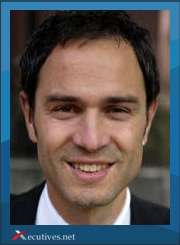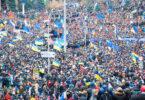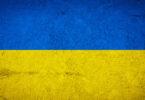
Dr. Daniele Ganser. Foto: Basile Bornand
Dr. Daniele Ganser, born 1972, studied History, Philosophy and Anglistics at the University of Basel and the University of Amsterdam and has been intensively involved in Peace Research for several years. With his dissertation “NATO- Secret Armies and Devised Terrorism in Europe during the Cold War” he was already early on giving attention to a subject that, with the attack of 9/11, would quickly become universally omnipresent. Soon after 9/11 there arose doubts about the official account of the happenings surrounding the attack. These doubts were and are still today primarily concerned with the question of whether the attack was planned by, or known about by, the US government. Peace Researcher Ganser examines the true objectives behind many wars. Peak Oil, the lies about weapons of mass destruction, alleged atomic bombs in Iran, Swiss neutrality, terrorist attacks and renewable energy sources all appear in an interesting, thought-provoking correlation. Read here a discussion which shows how complex various political and economic decisions are, how widely the opinions diverge, and how Switzerland is also affected.
Dueblin: Dr. Ganser, you have concerned yourself with geopolitical problems, the subject of Peak Oil and with renewable energy resources. You have also conducted studies in Peace Research and written several books about war, terrorism and secret armies as well as about devised terrorist attacks. In your opinion, what connects these various and, at first glance, quite diverse subjects together? What is the driving force behind your work?
Dr. Daniele Ganser: The foundation that connects these subjects is, for me, clearly peace research. I realized very early that I lead a very privileged life in Switzerland. We are on a sort of island. There are no landmines here, you won’t be shot, there are educational opportunities for everyone and you can drink the water straight out of the faucet. If you compare this situation with people who live in other countries I have travelled in and which were the focus of my studies, you must prepare yourself for a shock. It was my goal to uncover certain relationships and machinations in the world.
My first book dealt with the Cuban Missile Crisis. It was about the deployment of nuclear missiles in Cuba. This led to extreme tensions and the world came very close to a disaster that could have started the Third World War. Among other things, I wanted to highlight the role of the world peace organisation UN in connection with this crisis more closely. I quickly realized that several things about my conceptions of this world peace organisation didn’t make sense and I set out systematically and scientifically to get to the bottom of these things.
Dueblin: What did you discover in your studies and what motivated you later to examine other violent conflicts?
Dr. Daniele Ganser: The Americans were already waging a secret war against Cuba since Fidel Castro seized power in 1959. The problems between those two countries did not begin with the missile crisis in 1962. It was always the goal of the USA to overthrow Fidel Castro. The most well-known and CIA-planned example that most people are familiar with is probably the Bay of Pigs Invasion in 1961. This was unsuccessful. After that, the Pentagon developed a secret plan called “Operation Northwoods”. According to this plan, the Americans wanted to blow up an American ship off the coast of Cuba and blame the attack on Fidel Castro. They also had the idea of detonating a drone over Cuba with the intent of blaming Cubans for the destruction. Even within the USA, they wanted to stage attacks which could later be blamed on Fidel Castro. Documents from the Pentagon prove that the Pentagon had planned acts of terrorism in order to more easily generate public support for a war against Cuba. The plan was never carried out because President Kennedy rejected it. I found this approach of secret warfare both abhorrent and fascinating at the same time and wanted to learn more about its political and economic context.
Dueblin: You convey a clear message and have taken a lot of flak because of the many comments you’ve made and the subjects that you have pursued. What was your experience like here in Switzerland in this regard?
Dr. Daniele Ganser: As I began writing about the Cuban Missile Crisis and started to research secret warfare, in Nicaragua for example, and could present proof, the University remunerated this. I got top marks and they praised my work. At that time, however, I had not done any media work or given interviews. However, I was already well-connected with other researchers worldwide with whom I exchanged books and texts. The USA and England are countries with a tradition of conducting secret warfare. So it is not surprising that the majority of my contacts, researching the same field, are from London and Washington. They constitute a sort of intellectual opposition in their own countries. These people understand secret warfare and don’t support it. Time and again they call attention to the fact that it is simply not true that the USA and Europe (the NATO countries) have, since WWII, above all advocated human rights and democracy and that all their wars have served these purposes. This is, indeed, a very dishonest statement which does not concur with the facts. These researchers and experts, from whom I was able to learn a lot, show clearly that, in many cases, war only serves to realise economic interests: profit. This, of course, does not please everyone equally. I, personally, wanted to pursue peace research, but especially to highlight the area of “secret warfare.”

Dr. Daniele Ganser, Nato’s Secret Armies. Operation Gladio and Terrorism in Western Europe
Dueblin: Back then you examined NATO with a fine-toothcomb and wrote a book about clandestine secret armies and devised terrorism which received worldwide recognition. In this doctoral thesis you dealt with the subject of terrorism. What made you explore that subject which, for a layman, sounds rather exotic?
Dr. Daniele Ganser: At the time I was looking for a fascinating subject for my dissertation, one that no one had yet worked on and I got a lead from the USA, that the subject of NATO and secret armies had not yet been researched. In 1998 I began to look into NATO’s secret armies and devised terrorism and started researching. In 1998 no one ever spoke about “terror.” Four years later, in 2001 my dissertation was finished. Shortly thereafter was the attack on 9/11, which everyone is familiar with. Within minutes the interest in and around the subject of “terrorism” changed dramatically and, because of my doctoral thesis, I was contacted by several media sources about the subject. I certainly hadn’t expected that. My book about the NATO and the secret armies has since been translated into more than 10 languages and has sold extremely well. For a doctoral thesis that’s quite unusual.
Dueblin: Your dissertation was widely acclaimed. The magazine „Der Spiegel“ even took on the subject and called attention to the criminal machinations that you described in your book. However, you were also faced with a great deal of criticism because your assertions shook up a view of the world that many people believed in and did not want to let go of. How did you handle this criticism?
Dr. Daniele Ganser: I received a lot of praise; that’s true. Some criticized me. That’s true too. Certain circles especially did not wish to hear my criticism of the NATO. They never believed that NATO’s secret armies planned or carried out terrorist attacks, as my research suggested, but that the secret armies would only have been activated if the Soviet Union had occupied Western Europe. It is a difficult area of research. It has been proved that NATO kept secret armies. In Italy this secret army was known as „Gladio“ and in the event of a communist invasion, it was to be used for guerrilla warfare. These units were also equipped with explosives. There have been terrorist attacks in Europe in connection with NATO. There are people known to have carried out these terrorist attacks and were covered by NATO. These are proven facts. The only reason that the Gladio-secret army was even discovered at all, was due to a closer investigation of the terrorist attack of Peteano in 1972. There are various connections between NATO’s secret armies in Europe and devised terrorism, even if no one wants to talk about it. Nevertheless, I did receive a great deal of acclamation for my research of NATO overall. However, as my students pushed me to say something about the terrorist attacks of September 11, 2001, problems arose. I was holding seminars at the Basel and Zurich universities on the subject and I had also spoken to journalists about it, and I was severely criticized for that.
Dueblin: You have reported a lot on the attacks of9/11 and early on pointed out that several things in the official version of events raise questions. There are now a large number of conspiracy theories spreading through the media. How did you become interested in this subject and why does 9/11 still concern you today?
Dr. Daniele Ganser: I have to say that I did not choose this subject. I was simply the only researcher in Switzerland at that time who had just completed a doctoral thesis on terrorism and hidden warfare. Claiming nearly 3’000 lives, 9/11 was the largest terrorist attack in history. Therefore, I wanted to know more about the circumstances. An expert on terrorism and hidden warfare can’t say that he knows nothing about 9/11. That would be like a doctor saying he knows nothing about the flu. It’s just not acceptable. 9/11 is relevant to peace research as well, since the Afghanistan and Iraq wars are directly connected to it, along with military spending and the current dominating enemy stereotypes.
Dueblin: You mentioned early on, that in the official report from the USA, a third tower which also collapsed was not mentioned. This is odd. What is the story on this ominous third tower? Most people know only about two towers – the ones the planes flew into.
Dr. Daniele Ganser: The fact that there was no mention of the building in the official investigative report is quite remarkable and raised questions world-wide. This opened a sort of analytical window. If the investigative report was incorrect, then there is all the more reason to investigate further about what actually happened. Soon the question was raised whether the attack was part of a geo-strategic intrigue to get to oil resources. These questions overlapped with the studies I have been pursuing for years on the subject of Peak Oil.
Dueblin: Can you give us some details about the third tower and the inconsistencies that occurred, in your opinion?
Dr. Daniele Ganser: The 11th of September 2001 was a Tuesday. The first plane crashed into one of the towers at 8:46am; the second plane shortly after 9:00am. The towers burned and collapsed before 11am. We’ve seen the photos in the media. For most people that was the 11th of September 2001. Many people only heard only later (if at all) about fact that a third plane crashed and a fourth flew into the Pentagon. The two towers, recognition symbols of the USA, were the center of attention. Almost immediately, the US-President declared that this was an attack by Bin Laden. Well then, here are a few things that clearly don’t add up and need to be clarified. On the same day at 5:20pm, a third building collapsed not far from the other towers. This was Building WTC7, World Trade Center Nr. 7. This building, however, was certainly never hit by an airplane.
Dueblin: Why is it that so few people know about this building and why, in your opinion, did it collapse?
Dr. Daniele Ganser: I need to go back a bit to answer this question: I was working at the Research Center for Security Policy at the ETH Zurich when the Iraq war started in 2003. In the run-up to the war, the talk was about the alleged weapons of mass destruction that they wanted to find and destroy, at least that was the official version that George W. Bush and Tony Blair argued for so vehemently. Among researchers there was great doubt about this. Even then, no one could provide proof. After the war had started and it was clear that the Bush-Administration had lied about the weapons of mass destruction, the question was raised as to whether Bush also lied about 9/11. Today we know with absolute certainty that there were never any weapons of mass destruction in Iraq. At that time, I took some photos of the collapsed third building to the structural engineering department at the ETHZ and showed them to two renowned, retired professors, Jörg Schneider and Hugo Bachmann: both excellent structural engineers. They both came to the same conclusion: that the building most likely did not collapse due to fire. They both strongly believed that all the clues pointed to a detonation. However, such a detonation would take days to prepare – and that preparation would have to have taken place before the 11th of September 2001, meaning before the attack!
Dueblin: What led them to believe it was a detonation?
Dr. Daniele Ganser: There was a video which showed how the building collapsed. All 82 steel columns of the building fell apart and plummeted to the ground. For this to happen, all 82 steel columns must give way at the same instant. This can only be achieved with a planned detonation. We all sat there and watched the video. Both professors asked me if perhaps a rocket flew into the building. But that didn’t happen neither was the building hit by an airplane.
Dueblin: You studied the official9/11 Commission Report carefully. What was the official account of the event?
Dr. Daniele Ganser: This building was not included in the report. It simply wasn’t mentioned. There were however, other committees in the USA, which point out the existence of this building. The New York Times referred to it as the „greatest mystery of 9/11“. After that, there was an official statement made saying that yes, the building had existed but collapsed due to fire. This is the version that they are sticking to even today. So, after first denying everything about a third tower, suddenly no one is disputing the fact that there was, indeed, a third tower, and that it had collapsed. Furthermore, BBC reported the collapse of the building a half hour before it collapsed! You can see in the TV footage, the reporter talking about the building collapsing, but the building is still standing in the background. All of this was very confusing. The question was then raised: how did BBC know that a building was going to collapse? This led to a very intense debate on BBC. Years later BBC admitted that they reported about the collapse too early. They had received the news from Reuters and, in the heat of the moment, the journalist just read it aloud. But still the question remains: how did Reuters know that WTC7 was going to collapse?
Dueblin: Where does the government stand on the events surrounding the third tower?
Dr. Daniele Ganser: The National Institute for Standards and Technology (NSIT) finally commented on behalf of the American government. This institute is comparable to our Eidgenössischen Material Prüfungsanstalt (EMPA) The experts for material science and engineering say that the building collapsed due to fire and extreme heat. However, the NIST is part of the government and, so, under political pressure to confirm the government’s version of events.
Dueblin: 9/11 is in certain respects comparable to the sinking of the Titanic. Something happened that no one ever expected. Many people react to this subject primarily on an emotional level. Someone who questions the events, is often accused of being a traitor or conspirator. When there are clearly so many things that have not been explained, and without a doubt things continue to happen that would be better examined more closely, how do you explain this reaction?
Dr. Daniele Ganser: 9/11 is truly a very emotional subject. And everyone has an opinion about it, even those people who never bothered to inform themselves about it, let alone conducted research on it. The opinions that most people have is pure TV- opinion. We all have these monumental pictures in our heads that we were intensively influenced with. We have overwhelming media coverage filled with surprises, full of suffering where you see so much dust and misery, even calls for help are heard and people throwing themselves out of windows. All of that is directly connected to Bin Laden in our heads. We were all in shock and we assimilated this information via these pictures. Here I should mention that, at the time, there was absolutely no evidence Bin Laden was really behind the attack. For example, no one saw him in one of the airplanes. The connection to Bin Laden is based solely on the declarations made by the US government, which you can choose to believe or not.
Dueblin: You have studied the various theories about the attack. Based on the findings from your studies and research, what can you tell us?
Dr. Daniele Ganser: There are three theories being discussed. The Surprise-Theory, states that Bin Laden was the mastermind behind the attacks. This is one possibility. For this theory to be believed, the statements by Bush and Cheney must be seen as accurate. A second theory states that the terrorists did indeed attack, but Bush and Cheney are criminals because they knew about the attack in advance but chose to let it happen for strategic reasons (oil and gas interests, reduction of civil rights and raising the Pentagon’s budget). This is called the „Let it Happen On Purpose-Theory“ (LIHOP). According to this theory, someone is prepared to kill several people in order to promote certain other interests. The third theory states that Bin Laden had nothing to do with the attack and that criminals working for the CIA and in the Pentagon were behind the attacks. This theory is called MIHOP, „Make it Happen on Purpose“.

Dr. Daniele Ganser, Europa im Erdölrausch – Die Folgen einer gefährlichen Abhängigkeit; Orell Füssli, 2012
Dueblin: The last two theories, whether true or not, must be seen in the context of the hunt for oil; a hunt that without a doubt is reality.It is possible that after Iraq, the developments in Iran are also connected to oil resources. From the viewpoint of a peace researcher, what is happening in Iran at the moment and generally when countries want to seize oil resources?
Dr. Daniele Ganser: You know that when the American president comes to the microphone, that what he is announcing might not always be the truth. The same is true for the Prime Minister of England. There is dominating feeling of political sullenness because people have seen through certain lies. Essentially weapons of mass destruction was the main argument in favour of the war in Iraq, in which 100‘000 people lost their lives. Now, there are people who say that the war in Iraq was a greater crime than 9/11 with only 3’000 deaths. Colin Powell, the Secretary of State at the time, has apologized for his comments to the Security Council regarding the weapons of mass destruction, and admitted that it was all made up lies. He said that he had been misled.
In light of all the facts around the war in Iraq, one must come to the conclusion that people kill to get oil. You have to realize that. The crude oil production in Europe has been falling continually for the last 10 years; and we are using more and more oil every year – in Europe 15 million barrels per day! The Americans use 20 million barrels per day. The Americans already reached their production limit, the so called Peak Oil in 1970. They tried to compensate for the gap that has arisen with oil shale and gas, but the gap continues to grow as large old oil fields are depleted. The third major power which needs this energy as well, is China: a country that currently uses 9 million barrels a day. These three world powers will fight more and more over oil. You have to hide your head in the sand if you don’t want to see that certain wars are only being fought over oil resources.
Dueblin: There is a great deal of controversy in matters related to oil reserves. You have been researching “Peak Oil”. What is that and how, in your opinion, is it related to military operations?
Dr. Daniele Ganser: In my opinion, the wars in Iraq and also in Libya were not fought in order to bring about a democratic government or to protect human rights. Europe and the USA have continually violated human rights and sacrificed democracies. There is disagreement in the research relating to Peak Oil. I, however, am of the opinion that it was already reached in 2006 for conventional crude oil. The world uses 44 super-tankers filed with oil per day. That is not just a little oil! One tanker holds 2 million barrels. So, the world uses 88 million barrels daily: about a quarter of that is used by the USA alone. To get oil, we often behave like heroin addicts who would steal an old lady’s handbag and even risk fatally injuring her. Addicts take great risks, and when it comes to oil, we are all addicts.
Dueblin: But who, in your opinion, are the people acting behind the scenes essentially as war mongers? Are these “oil addicts” who use violence to get their “ fix” individuals or possibly governments?
Dr. Daniele Ganser: Every case must be looked at individually. Finding the people who “pull the strings” is very difficult. In general, we are talking about groups which are constantly changing. The deadly cocktail is the spreading and fuelling of lies combined with violence. These are more likely to be men who are involved and it happens in all countries in all religions. From a peace researcher’s point of view, I can give you an example of how this fuelling of lies and violence provocation works: When it became difficult to justify a war against Saddam Hussein after his invasion of Kuwait, a girl named Nayirah was introduced to the media and to the American congress who claimed that Saddam’s soldiers came into the neonatal ward of a hospital in Kuwait, took newborn babies from their incubators and threw them on the cold floor to die. The news of this spread like wildfire all over the world. It was later discovered that this girl had never worked in this hospital. This “Incubator Lie” was actually a PR-device to fuel emotions, pursue war interests and gain support for the war among the American people. After so many studies and meticulous research on this and similar cases, I am still astounded by the ease in which such lies can be spread.
Dueblin: It would seem that pointing to a particular situation isn’t really working so well this time. I’m thinking of the current nuclear bomb discussion about Iran, for example. Just recently the CIA had to admit that there really are no nuclear weapons in Iran. Professor Albert A. Stahel, in his interview with Xecutives.net, saw this as a strategic move in connection with the upcoming presidential election in the USA. Apparently Obama should be spared the decision of going to war, regardless of how he would react, as this could jeopardize his election.
Dr. Daniele Ganser: Iran does not currently have an atomic bomb. I don’t know whether they are planning to build one, as Israel believes. However, many other countries have nuclear bombs. By no means can every country with nuclear weapons be attacked. That would be total chaos. We consume war propaganda every day. Today, it is clear to most informed people that the weapons of mass destruction propaganda which led to the war in Iraq was a lie. This is just one of many examples, though. We just have too little information about the other correlations.
There are several other examples that I could name which are based on the same principle. Many wars have simply not yet been deconstructed and people still believe that they were for an honourable cause. They just don’t have enough information to declare that a war is “not OK”. This type of thinking would, however, be a prerequisite for preventing further wars. But we are a far cry from this. We still believe that we can prevent violence with violence. This doesn’t work, though, as history has clearly shown. We must resolve conflicts with respectful dialogue, without violence. Apropos war propaganda, we are talking about techniques developed and applied very effectively by Geobbels in WWII. These are the same techniques that are used today in a slightly modified form. You create a concept of the enemy, fuel emotions like hate, greed and fear, stage the first shot and then the war happens automatically.
Dueblin: So after everything you’ve said, do you believe that wars over resources will increase?
Dr. Daniele Ganser: I am convinced that resource wars will get worse. You mentioned Ahmadinejad, a beautiful example of a power struggle over oil that is happening now and could escalate. There are powers interested in a war to get their hands on that country’s extensive oil reserves. In addition to Saudi Arabia, Iran possesses the largest oil reserves in the world. For people who are interested in oil, this is a “Dreamland of Loot”. We are bombarded with media information which says that Iran is building an atomic bomb. We know today, as mentioned earlier, that Iran doesn’t have an atomic bomb. The countries wanting to attack Iran, (these are the USA, Israel and England) all have nuclear weapons. This is already something very conspicuous. The argumentative balance is missing completely. Frankly, I would prefer that Iran not have an atomic bomb. But I would also prefer that those three countries didn’t either.
Countries without atomic bombs watch today how countries without atomic bombs are simply dismantled and, I can’t say it any other way, levelled to the ground. Countries with nuclear weapons are not touched. Think of North Korea where, in respect to human rights, things have certainly gone wrong. It’s no wonder then that certain countries without atomic bombs, would really like to have one.
Dueblin: What should and can Switzerland do about these wars and threats of war? What is Switzerland’s role?
Dr. Daniele Ganser: Switzerland should break away from its dependence on oil. I have demonstrated in my studies how this is possible. In Switzerland we are observing an energy turnaround. This certainly has a lot to do with the effect of Fukushima on Switzerland. People have been shaken up by the subject of energy resources, and there is a need to disconnect ourselves from oil and fossil fuels in general. But it’s not enough to just turn off the five nuclear power plants in Switzerland. We need to find ways of finding new energy sources and ways to save energy. The oil shortage is inescapable. Oil will get more and more expensive because the need for oil is increasing but the oil reserves are decreasing. We mainly have to concentrate on heating oil and on transportation.
Dueblin: Dr. Ganser, what are your wishes for Switzerland and the energy resource problems that exist and must be resolved?
Dr. Daniele Ganser: Switzerland does not have troops that they, like other countries, send into oil-rich regions of the world to secure oil reserves. That is a good thing. Swiss neutrality must remain upheld. Just imagine what would happen if countries no longer sent troops into other countries. We could solve a lot of problems that way. Switzerland should continue not sending troops to war. What we can do is insulate our houses better and adjust our consumerist behaviour. This is doable. Other countries, like the USA, are taking a completely different approach. Houses are not insulated at all and they are still driving cars that use monstrous amounts of petrol. With this mindset, the people in the US have no choice but to send their troops into other countries to secure oil reserves. Switzerland has a time-honoured tradition of showing that conflicts can be resolved without violence. Conflict is not a bad thing. One can grow from it. If it leads to war, however, there is only misery.
Dueblin: Dr. Ganser, I thank you very much for this interview and wish you all the best for you and your research!
(C) 2012 by Christian Dueblin. All rights reserved. Other publications require the author’s explicit consent.
______________________________
Links
– Swiss Institute for Peace and Energy Research SIPER
– Homepage





